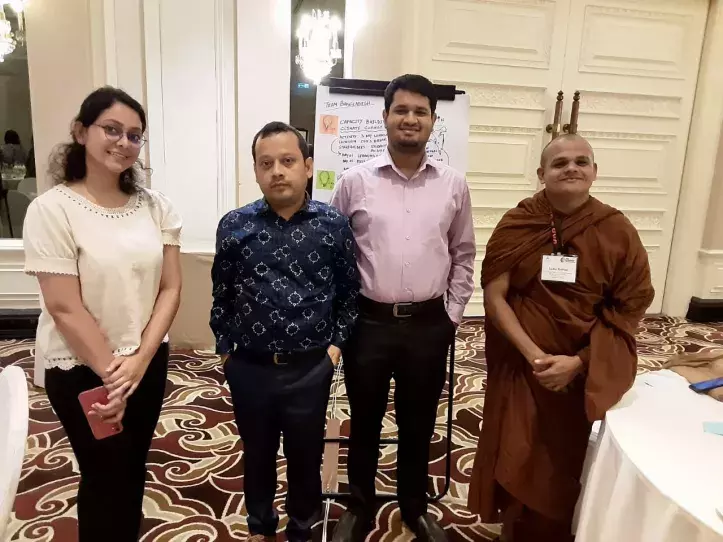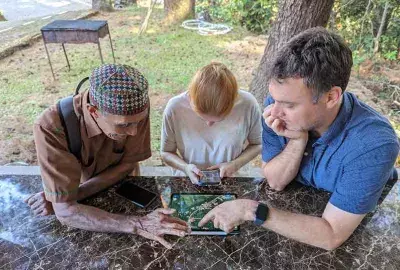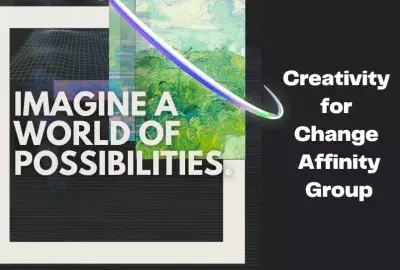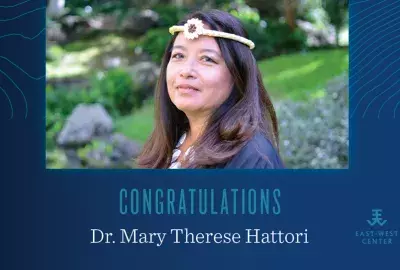Error message

OFFICE/DEPARTMENT
By Afsara Binte Mirza and Savio Rousseau Rozario
The following article is an outcome of the four-day long workshop titled “Building Bridges for Community-Centered Climate Resilience” organized by East-West Center and Rockefeller Foundation in Chiang Mai, Thailand, September 3-7, 2023.
Overview
The impact of human-induced climate change is one of the greatest challenges of today’s time, affecting the communities living on the frontline across different geographic boundaries. Local communities have faced challenges in adapting to the changes with their traditional knowledge and strategies which should be considered, recognized, and mainstreamed in any development interventions. To reach the local community and to bring them to the heart of decision-making processes, we find that ‘empathy’ is a key enabler. The workshop organized by EWC was exemplary in building bridges within and across different communities to withstand the global crisis of climate change.
Ensuring Local Participation and Easing Language Barriers
We strongly believe this was an enlightening and different workshop compared to traditional ones. It was inspiring to witness how the participants from the six different countries (India, Bangladesh, Myanmar, Thailand, Cambodia, and Indonesia) had the liberty to speak in their native tongues, with their peers acting as facilitators and translators simultaneously.
This changed the whole dynamic of the room, as we got the chance to connect and reflect on similar existing challenges (such as water scarcity, the disconnect between grassroots level contexts and climate change policies, weak local governance systems, existing social, political, and economic bottlenecks) and locally driven solutions (such as water management strategies, evidence-based advocacy, women’s leadership, capacity-building).
For instance, a female community leader and mobilizer from India expressed in Hindi how boulder check dams were established through the collective work of her community amid hill forests. She also emphasized that this community-driven local action enhanced the water bodies of the springs in the forests and ameliorated the biodiversity of that area. This drew the attention of the participants and we could witness everyone in the room being good listeners and nodding their heads contentedly. Without the true representation of the local voice, this energy at the workshop would not be possible.
Interactive Games Promoting Empathetic Thinking
Two new participatory games were introduced during the workshop and seemed interesting to us, the General Systems Theory conceptualized by Joanna Macy and the Groundwater Governance game.
The General Systems game began by making participants form a full circle in the event room, following some rules about moving in relation to one another. In the end, the game signified how much everyone (meaning human beings and other species) in an ecosystem matters and inevitably strives to maintain a functioning relationship with each other.
On the contrary, the water governance game demonstrated the importance of collective action, local governance dynamics, social cohesion, and community-centered management techniques.
In our opinion, both games were played to embed a sense of empathy and perseverance in the face of tackling the adverse effects of climate change.
Bottom-up Approach for Better Policy Making
We particularly want to reflect on the expression “Policy- does it mean local disconnect?”, a phrase which arose from one of the workshop facilitators. This expression signified the urgency to segue from top-down to bottom-up approaches when it comes to localized policy making targeted at ameliorating the livelihoods and resilience of local actors.
This means that establishing a climate change adaptation/mitigation policy without consulting the local community can be ineffective and maladaptive. Similarly, it is prime time we acknowledge marginalized communities as the ‘agents of change’ rather than being beneficiaries as they hold valuable local and traditional knowledge; are cognizant about their existing resources' vulnerabilities; and are the innovators of their own localized solutions.
Throughout the four days of the workshop, we also acknowledged that language barriers can deliberately reinforce top-down approaches to policymaking. Therefore, accessible communication in local languages is key with the local actors. Above all, it is vital that the local government bodies are aware and have good capacity to address any existing or upcoming policies on climate change.
Learning and Reflecting through Field Visits
The workshop also accommodated a day-long field visit at the Mae Kuang Dam. The dam is an essential infrastructure of Northern Thailand, storing and supplying water to urban areas and for completing agricultural and irrigation activities in rural and peri-urban areas.
We found it interesting how the Joint Management Committee (JMC) of the dam functions and meets with the farming community twice a year to decide on the usage of water and quantity required per harvesting season. The committee also informs the farmers in advance when the water level in the dam reservoir is low to maintain transparency in their operations.
During the field visit, we also had the opportunity to meet a few local farmers. Coincidentally, while having a focus group discussion with the farmers, we realized how the farmers in Thailand and Bangladesh are facing similar challenges due to the impacts of climate change and existing social, economic, and political challenges.
The farmers expressed how they have minimal agency to voice their opinions to the government bodies; that the costs of fertilizers are rising; erratic rainfall; children of farmers moving away from farming and less interested in taking forward intergenerational agriculture.
Prioritizing Local Contexts for Harnessing Locally-led Adaptation Solutions
This workshop was instrumental in rooting community-driven adaptation solutions in empathy and active listening as two key enablers for doing so. The moment we start prioritizing local contexts alongside the economic, social, cultural, and political dynamics of an area while designing an adaptation intervention, the real climate change heroes who are at the frontlines of tackling the crisis will be incentivized to implement and maintain adaptation interventions. Therefore, working alongside the local actors as well as building their capacity is a must going forward.
Afsara Binte Mirza is a Research Officer in the Locally Led Adaptation Program, International Centre for Climate Change and Development (ICCCAD). Email: [email protected]
Savio Rousseau Rozario is a Program Coordinator in the Locally Led Adaptation Program, International Centre for Climate Change and Development (ICCCAD). Email: [email protected]
By Afsara Binte Mirza and Savio Rousseau Rozario
The following article is an outcome of the four-day long workshop titled “Building Bridges for Community-Centered Climate Resilience” organized by East-West Center and Rockefeller Foundation in Chiang Mai, Thailand, September 3-7, 2023.
Overview
The impact of human-induced climate change is one of the greatest challenges of today’s time, affecting the communities living on the frontline across different geographic boundaries. Local communities have faced challenges in adapting to the changes with their traditional knowledge and strategies which should be considered, recognized, and mainstreamed in any development interventions. To reach the local community and to bring them to the heart of decision-making processes, we find that ‘empathy’ is a key enabler. The workshop organized by EWC was exemplary in building bridges within and across different communities to withstand the global crisis of climate change.
Ensuring Local Participation and Easing Language Barriers
We strongly believe this was an enlightening and different workshop compared to traditional ones. It was inspiring to witness how the participants from the six different countries (India, Bangladesh, Myanmar, Thailand, Cambodia, and Indonesia) had the liberty to speak in their native tongues, with their peers acting as facilitators and translators simultaneously.
This changed the whole dynamic of the room, as we got the chance to connect and reflect on similar existing challenges (such as water scarcity, the disconnect between grassroots level contexts and climate change policies, weak local governance systems, existing social, political, and economic bottlenecks) and locally driven solutions (such as water management strategies, evidence-based advocacy, women’s leadership, capacity-building).
For instance, a female community leader and mobilizer from India expressed in Hindi how boulder check dams were established through the collective work of her community amid hill forests. She also emphasized that this community-driven local action enhanced the water bodies of the springs in the forests and ameliorated the biodiversity of that area. This drew the attention of the participants and we could witness everyone in the room being good listeners and nodding their heads contentedly. Without the true representation of the local voice, this energy at the workshop would not be possible.
Interactive Games Promoting Empathetic Thinking
Two new participatory games were introduced during the workshop and seemed interesting to us, the General Systems Theory conceptualized by Joanna Macy and the Groundwater Governance game.
The General Systems game began by making participants form a full circle in the event room, following some rules about moving in relation to one another. In the end, the game signified how much everyone (meaning human beings and other species) in an ecosystem matters and inevitably strives to maintain a functioning relationship with each other.
On the contrary, the water governance game demonstrated the importance of collective action, local governance dynamics, social cohesion, and community-centered management techniques.
In our opinion, both games were played to embed a sense of empathy and perseverance in the face of tackling the adverse effects of climate change.
Bottom-up Approach for Better Policy Making
We particularly want to reflect on the expression “Policy- does it mean local disconnect?”, a phrase which arose from one of the workshop facilitators. This expression signified the urgency to segue from top-down to bottom-up approaches when it comes to localized policy making targeted at ameliorating the livelihoods and resilience of local actors.
This means that establishing a climate change adaptation/mitigation policy without consulting the local community can be ineffective and maladaptive. Similarly, it is prime time we acknowledge marginalized communities as the ‘agents of change’ rather than being beneficiaries as they hold valuable local and traditional knowledge; are cognizant about their existing resources' vulnerabilities; and are the innovators of their own localized solutions.
Throughout the four days of the workshop, we also acknowledged that language barriers can deliberately reinforce top-down approaches to policymaking. Therefore, accessible communication in local languages is key with the local actors. Above all, it is vital that the local government bodies are aware and have good capacity to address any existing or upcoming policies on climate change.
Learning and Reflecting through Field Visits
The workshop also accommodated a day-long field visit at the Mae Kuang Dam. The dam is an essential infrastructure of Northern Thailand, storing and supplying water to urban areas and for completing agricultural and irrigation activities in rural and peri-urban areas.
We found it interesting how the Joint Management Committee (JMC) of the dam functions and meets with the farming community twice a year to decide on the usage of water and quantity required per harvesting season. The committee also informs the farmers in advance when the water level in the dam reservoir is low to maintain transparency in their operations.
During the field visit, we also had the opportunity to meet a few local farmers. Coincidentally, while having a focus group discussion with the farmers, we realized how the farmers in Thailand and Bangladesh are facing similar challenges due to the impacts of climate change and existing social, economic, and political challenges.
The farmers expressed how they have minimal agency to voice their opinions to the government bodies; that the costs of fertilizers are rising; erratic rainfall; children of farmers moving away from farming and less interested in taking forward intergenerational agriculture.
Prioritizing Local Contexts for Harnessing Locally-led Adaptation Solutions
This workshop was instrumental in rooting community-driven adaptation solutions in empathy and active listening as two key enablers for doing so. The moment we start prioritizing local contexts alongside the economic, social, cultural, and political dynamics of an area while designing an adaptation intervention, the real climate change heroes who are at the frontlines of tackling the crisis will be incentivized to implement and maintain adaptation interventions. Therefore, working alongside the local actors as well as building their capacity is a must going forward.
Afsara Binte Mirza is a Research Officer in the Locally Led Adaptation Program, International Centre for Climate Change and Development (ICCCAD). Email: [email protected]
Savio Rousseau Rozario is a Program Coordinator in the Locally Led Adaptation Program, International Centre for Climate Change and Development (ICCCAD). Email: [email protected]







